#teeline
Explore tagged Tumblr posts
Note
do u have a reccomendation for what form of shorthand to learn first. deeply interested-- i saw ur reply on that one post and then u seem cool so i just followed u and figured i would ask here
hello !!! thank you for asking !!!!!!!!!! and im so sorry this is so long lol
If you want my biased personal recommendation, I would suggest Pitman New Era. That's what I use, and I think its the best balance of efficiency vs difficulty to learn, and I like that the learning curve is such that, as you learn, you apply more rules that simplify the writing process more (meaning that earlier practice is still legible, if far less efficient). This compared to other forms (like Gregg) where, as you learn, youre just kind of generally suffering and trying to get your brain to memorise things and differentiate very similar looking strokes. I find Pitman also lends itself well to using in conjunction with other "standard" writing styles so you can take notes that are enough in "standard" writing to be skimmable while using enough shorthand to be much faster to write, basically maninmising writeing AND reading speed. [example below]

You can skip to the end for resources for Pitman and shorthand in general if this answer is sufficient :)
If you want a horrifically long, massively autistic answer that breaks down the three most popular/common styles, then thats what the rest of the post is !! It is so fucking long I am so sorry
Horrifically Long Answer:
I'm answering on the assumption that you would be learning for use with english. If you want to learn shorthand for another language there are a variety of options however I am less versed in them :( I'm also assuming you're asking out of personal interest rather than vocational, since certain jobs will recommend or require you learn certain styles of shorthand and it would be best to defer to that.
The most popular methods are Gregg, the various forms of Pitman (this is what I use), and Teeline. Gregg and Pitman are phonemic while Teeline is alphabetical. There are also a huge number of other, less popular forms of shorthand (as well as shorthand systems which are popular in/made for other languages). If you're interested in learning about these, check out the subreddit listed at the end of this post under "resources".
Teeline:
I know much less about Teeline, so I'll go into it less, but basically it is a "spelling-based" shorthand system -- that is, it is based off the standard spelling of words. It replaces latin letters which different forms that are faster to write and can be connected more efficiently, while removing extraneous letters from words. It is simpler to learn, in part because it is spelling-based, and also because it has fewer rules which further consolidate and shorten word forms. Due to this, it is ultimately much slower to write than the other two systems mentioned here (although you can still get up to good speeds !!). Like the other shorthand systems, you can learn to a more basic extent, or learn more advanced theory to maximise its capability and speed. Teeline is very standard for journalism and overall quite popular for professional use, however it is still in copyright and so there are far fewer resources available online. If you are interested in taking classes, however, I would assume those are available.
Teeline TL;DR: alphabetical, simplest to learn but less efficient, popular, still in copyright so fewer resources.
examples of Teeline:
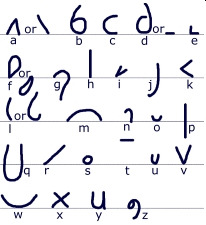


[images sourced from wiki]
Pitman and Gregg: Phonemic Systems and Regional Accents:
As mentioned, Gregg and Pitman are phonemic. If you dont have any practice with phonemic writing systems, you might have luck starting out with shavian just to practice. also because shavian is fun :) (its one of the writing systems in my header !) Im saying this partly because I want more people to learn shavian and partly because I learned Shavian long before I learned Pitman and found that having that practice was helpful. In particular, if you have any accent other than RP, its helpful for figuring out either which vowel sounds and phonetic spellings are relevant to your accent and your pronunciation, or, should you choose to go a "standard" (RP) route, how certain words should be spelled despite how you may pronounce them. Using a "standard" RP approach can be helpful if you want people to more easily be able to read your writing or want to "match" the dictionary, but someone well versed in shorthand should be able to figure it out no matter what, and if its just for your personal use I'd suggest just going by your own regional pronunciations.
Pitman:
Pitman was an early shorthand system developed in the early to mid 1800s. It used to be the most popular shorthand system, however nowadays has been eclipsed in popularity by Teeline and/or Gregg, depending on the country and occupational context. However, it remains popular among enthusiasts and there are significant amount of resources available for learners and practitioners.
The main thing to know with Pitman is that words are built using different strokes for each consonant sound, and symbols attached to these consonants to mark vowels. These consonant sounds are differentiated by shape as well as line thickness. Voiced and unvoiced pairs of consonants (eg., T and D, C and G, S and Z, etc.) are designated using the same strokes, with the voiced consonant of the pair being thicker than the other. This line variation is something which is normally achieved with a pencil, though I mostly use fountain pens to write and so I use flex nibs to achieve the same effect.
Vowels are marked with certain dots or dashes placed along corresponding consonant markings, For increased writing speed, most vowel markings can also be left off in Pitman, and instead where on the line the first stroke begins serves to signal the first vowel.
Pitman uses short forms (also called "logograms" or "grammalogues," depending on the version and book you use) which are abbreviated forms of commonly used words (see picture below for a few examples). Different versions of Pitman have different numbers of grammalogues.
With Pitman, efficiency is increased through a combination of memorising various short forms and implementing rules which simplify strokes. (Examples of these can be seen in the picture below. probably need to click to be able to actually see anything rip) This allows you to have certain "levels" of complexity, where as you learn more complex rules you increase in efficiency, but you can also eschew some of those rules if they are too complex for you without sacrificing legibility to you or proficient practitioners. Probably someone somewhere on reddit has something to say about that but tbh who gives a fuck. You can do whatever you want forever. Its known to be very common for people to come up with their own personal shortcuts and variations in whatever shorthand system they use, and imo sometimes that just means looking at a rule and going "well thats stupid👍" and ignoring it. Pitman can seem really intimidating, however just remember that you can ignore rules for as long as you want until they are less intimidating to learn and apply.
There are 3 "main" versions of Pitman: the original system, Pitman New Era, and Pitman 2000. New Era has the most complex system of rules and abbreviations, while 2000 simplified many of these and got rid of most of the abbreviations. I personally use New Era, in part because I was able to access more resources for this, but largely because I found the increased number of rules and abbreviations to be better in the long run. If you are willing to invest more time and effort into learning a more complicated system, with the tradeoff that it will be faster and easier once you are proficient, you should learn New Era. The main benefit of 2000 is that the rules are simplified. I would say, however, that the downsizing of the list of abbreviations is not a benefit. While it in theory requires you to memorise more individual symbols, in practice these abbreviations are commonly used enough that they can become automatic with very little practice. If you decide to learn 2000, I would suggest taking he time to go through the list of abbreviations from New Era and, if not learning all of them, picking out the ones you think you are likely to use with semi-regularity. If you compile them into a cheat sheet and hand it next to your desk, they should be easy to practice using and become memorised really quickly. I myself dont have every abbreviation memorised, but instead focused on ones i use regularly, and often go through the list again to pick out new ones to learn and add to my lexicon as I think they may be used.
Pitman TL;DR: phonemic, differentiates strokes through line thickness, rules can be applied or discarded as best suits your practice without sacrificing readability. Increased speed and efficiency is achieved through extra short forms for commonly used words, and rules which simplify strokes.
examples of Pitman:
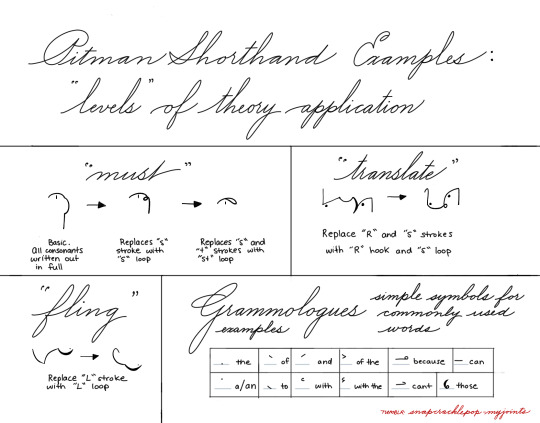


[first image mine, other two images sourced from Long Live Pitman's (website, linked below), and wiki]
Gregg:
Gregg is a very popular form of shorthand which utilises round, smooth strokes with the intent of increasing writing efficiency and legibility.
Where Pitman uses variation in line thickness to differentiate between strokes, Gregg uses line length. Both consonants and vowels are marked with designated strokes (compared to Teeline, which has vowel strokes but tends to omit them where possible, and Pitman, which adds vowel marking to consonant strokes or signals vowels through figure placement), and vowels are largely kept in-line. With Gregg, efficiency is achieved through the use of short forms, prefixes, and suffixes; "phrasing", (wherein certain phrases, such as "I may be," "one of the most," "by the," etc. are combined into a single stroke); as well as through the more efficient way in which strokes are joined together into words.
Left-handed people sometimes write Gregg from right to left.
Like Pitman, there are a number of different versions of Gregg, however Gregg seems to have significantly more versions and significantly less consensus around which version is best or why. I am not the best person to give advice on which one is best or information on the different types, so if you decide to go with Gregg I'd suggest checking out the subreddit or some of the other resources linked below for information on that.
examples of Gregg:

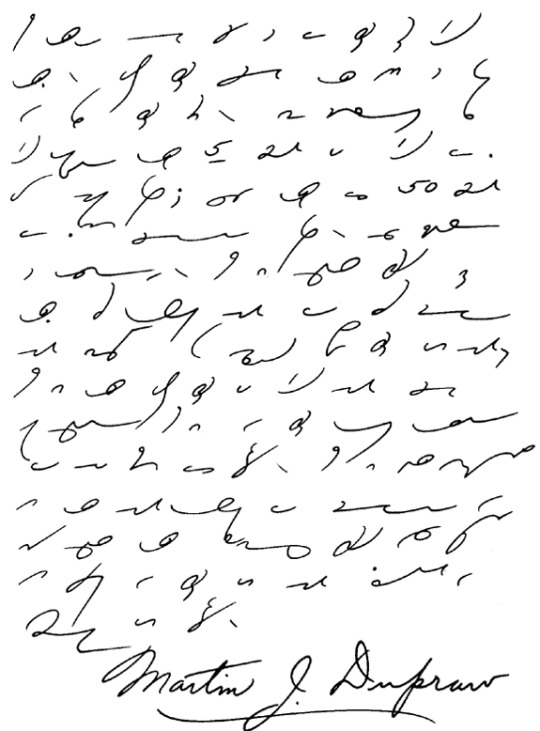

[Images sourced from wiki and gregg-shorthand.com]
Comparisons:
I would say that one of the main things to consider if choosing between Gregg and Pitman is which you think is more intuitive to read and write for you. Which sounds obvious lol but like. as an example. I struggle with spatial awareness and stuff like estimating lengths so for me Gregg is not a good option since it differentiates certain consonants through their length and I would have a hard time writing those consistently or easily reading them. Pitman is easier for me in that regard, as well as since it is more "choppy" (for lack of better word) which makes it much easier for me to recognise certain words without having to break them down, as well as making it easier for me to break them down to read them should I need to. On the other hand, some people find Gregg to be easier since its much "smoother" and flowier to write, which can be much faster and more intuitive for some.
Compared to Pitman, Gregg has significantly fewer rules to learn, making it in theory simpler, however, due to the way it is written, it requires significantly more practice to be able to consistently properly write and tell apart certain letters, words, and phrases. Once you are proficient in this, it is by far more efficient, however Gregg is very difficult to use while you are still figuring it out. Pitman, on the other hand, has significantly more rules, however you can continue to easily use it as you learn these rules and add them into your practice. The downside of this is that once you are fully proficient, it is less efficient than full proficiency Gregg. Essentially, the main difficulty with learning Gregg is telling apart different strokes and writing them so that they can be differentiated, while the main difficulty with Pitman is in learning the rules.
I havent talked much about Teeline because honestly I know far less about it, because it is so much harder to find resources on, and honestly because I'm a bit of an old man and personally prefer the older styles lol. Its popular for a reason, though !
I know it probably sounds like I'm shilling a lot for Pitman, however thats just because its what I use and know the most about, as well as because it is what works best for my unique considerations. Most people would probably be more likely to recommend Gregg (for a number of very good reasons !), however when I was first deciding which shorthand system to learn I saw very few people making the points that were most relevant to me (eg, that pitman can be used AS you learn, whereas Gregg is more of a "its useless until you actually have it down" situation, that Gregg is really difficult if you struggle with differentiating lengths, etc) so I feel the need to mention them
TL;DR: Everything:
Ultimately you should use whatever you think is best for you :) I'd say Teeline is your best bet if you are in journalism, or want something easier. Gregg is best if you want something popular, smoother to write, and extremely fast, and are willing and able to put in significant amounts of consistent work and practice to master it. Pitman is best if you want something you can use as you learn, and that's somewhere in between Teeline and Gregg in terms of difficulty and efficiency. If you wanted, you could probably learn Teeline as well as either Pitman or Gregg, but learning both Pitman and Gregg would be much more difficult.
Other:
I take all my notes by hand, generally using a mix of palmer method cursive and pitman shorthand to do so, however, I also have to write a lot of papers, and when I do, I get frustrated at having to type out whole words I normally write in shorthand. This is kind of the curse of shorthand, you get really annoyed having to type out "because". To deal with this, while typing in a word processor, I use an alphabetic shorthand I've come up with over time. I basically input a bunch of auto-replacements into my spellcheck, so that I can have shortcuts for commonly used words set up. so basically i can write: "here, . cnstrctn ` ntnl idntty served to lgtmse the ntn stte" and it will autocorrect to "here, the construction of national identity served to legitimise the nation state". Highly recommend this if you do a lot of writing, especially if a lot of the same topics and words come up a lot. Use whatever shortened versions feel intuitive for you, instead of something you've consciously + intentionally constructed, otherwise youre more likely to forget them or have them get mixed up.
Resources:
stenophile.com has a huge number of shorthand resources linked, particularly for Gregg and Pitman. If you end up choosing either of these I'd suggest starting here to find instruction books.
this website can transliterate into Pitman and Gregg, DEK and Stolze-Schrey (two German shorthand systems), and Sütterlinschrift (a historical German script)(also in my header !)
r/fastwriting is run by a very nice very dedicated man who posts a huge amount of content and resources on various shorthand methods, including lesser known ones. If you decide you want to learn/learn about a different shorthand system, he's the guy to talk to. This subreddit differs from r/shorthand or system-specific subreddits like r/greggshorthand, as those are more discussion-based for learners and practitioners, while r/fastwriting is better for research and being autistic. R/shorthand does have a number of resources listed for more popular shorthand systems, and is a good place to go for advice while learning.
Teeline:
blog with a few free resources
Pitman:
Pitman New Era Instructor and Dictionary. These are what I largely used to learn.
Long Live Pitman's: a website dedicated to Pitman, full of good information for beginning learners.
if you learn Pitman, as mentioned the line variation can be accomplished with a pencil, however if you want to get a bit fancy with it while staying on a budget, Fountain Pen Revolution carries a number of cheap yet reliable fountain pens with flex nibs, such as the FPR Indus or Himalaya. I'd suggest the steel flex rather than the ultra-flex for shorthand unless you have a lighter hand or have practiced with a flex pen before. I've also heard good things about the Noodler's Ahab pen but honestly find its very temperamental, needs tweaking (not ideal if youre a fp beginner) and just not as good. Both FPR and Noodler's pens are made of bioresin and must be kept away from solvents like isopropyl alcohol !!!
Gregg:
Gregg Phrasebook. Short guide to phraseology for Gregg
Gregg-shorthand.com: seems like a good place to start for learning Gregg. Answers some beginner's questions, and provides learning aids and reading material (transliterated into Gregg)
r/greggshorthand
greggshorthand.gibhub.io: a more in depth website with a number of book pdfs and lessons for various forms of Gregg.

#ahhh thank you for asking !!!! i love the opportunity to rant about this lol. im sorry this is so long also lol#if you want to know more abt anything in particular or want me to simplify anything since i know this is a lot lmk !!#and if you end up learning shorthand id love to hear about it <3#especially if u learn pitman i can send u some of the cheat sheets and shit i made and stuff.#i admittedly will be less help with other shorthand systems but id still love to hear abt it :)#ask#homeybee#shorthand#pitman shorthand#gregg shorthand#shavian#teeline#ceci says stuff#undescribed
28 notes
·
View notes
Text
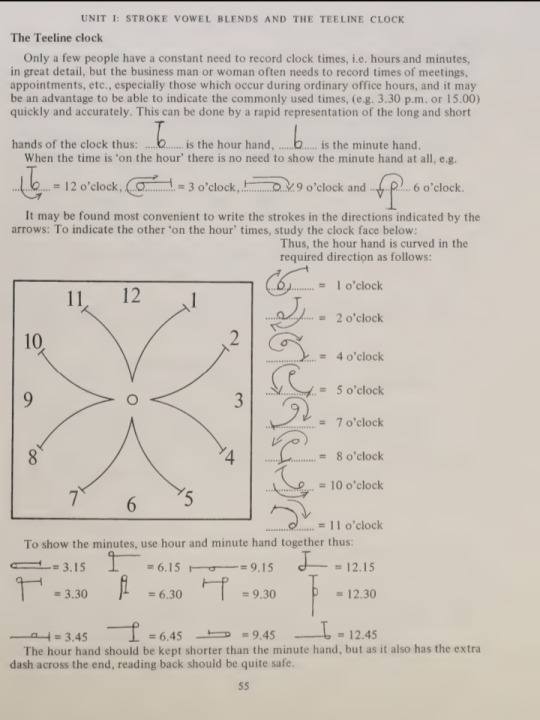
Jaw drops open
11 notes
·
View notes
Text

Baby’s first teeline. 🥹 (edit: I think I wrote gate instead of game. Also at the instead of for this)
Woke up 3 am worried how am I going to be able to take minutes at work one day. They have given me heads up but not the date yet. I think I need to learn short hand to make this possible. Because I have been practicing by taking notes in meetings in long hand and it is hopeless. I can’t get half the things on paper. I don’t know how the secretary does this.
Recording is always on option but sometimes the room is noisy or person is far or it’s confidential and they don’t want it recorded in your phone and I don’t have an actual recorder.
So maybe teeline then.
At least it can be a neat little way to write your diary Ann keep it secret.
2 notes
·
View notes
Text

while all the guys in this show are being absolute idiots, at least we have these queens
59 notes
·
View notes
Text
Torchwood Brainrot is so bad I'm learning shorthand incase I ever end up spying on the British government and need to translate some notes because I can't hear anything (and also because I love Ianto Jones did I mention????)
#torchwood#torchwood children of earth#children of earth#ianto jones#lois habiba#shorthand#learning teeline rn because its easiest#but does anybody know which type was used in torchwood? may need to go back and check
53 notes
·
View notes
Text
♡ last line tag game. share the last line of your wip and tag as many people as it has words.
I got tagged by @deepinifhell ! Thanks!!
I’ve been practicing my teeline shorthand by writing out some fic in my spare time. Lately I've been chewing on an AU where Barbie is 1) does magic with verbal/gestural components (inspired by this post) and 2) is frequently hired by Trappers for Reasons. Mason and Barbie meet when Unit Bravo busts in on some work she's doing for a local group of Trappers, she tries to magic blast him and...:3c
Here's a picture of the last line I wrote:

Writing hasn’t been the hardest part of shorthand, it’s been translating it all back to longhand. Here's what it says:
It’s all she knows, but surely there’s better opportunities for someone as clever as she is.
This bit is after Barbie's been captured and is being taken back to the Agency. She has no plans to stay captured. She also has A Huge Fucking Ego.
Now, for my part in this game...I'm going to tag...@whirly-wind @agentnatesewell @serenpedac @nat-seal-well @evilbunnyking
#darling writing#twc#wayhaven#darling speaks#wip#tag meme#The fic is very disjointed#mostly because the majority of the work is trying to write in teeline instead of long hand#but I'm having fun with it! I may take the pages I've written out by hand and use them for a future fic project#I really really want to focus on In Search Of before I start anything new though#barbara 'barbie' robertson
16 notes
·
View notes
Text
I hate having an idea for an essay or something similar in my mind but knowing that if I started it, I would demand a level of quality and research that would take a simply unachievable amount of time and effort and so I never make the essay
#writing#this is about my teeline guide and an essay on dual colours in Magic and their real-life cultural counterparts#and an essay on jazz and the modern cultural perception on it as well as perceiving it through a folk music lense#and my Unnamed Writing Project that has characters and a world in such of a plot and themes (plot development is by far my weakest skill)#and about that essay on sexism in discourse about pop music that I almost but never quite finished because someone else finished it for me#and also it wasn't about my Dark Souls x MTG UB concepts but it is now#actually that one I can probably just write because it's niche enough and needs little sourcing beyond rewatching VaatiVidya
1 note
·
View note
Text
Just plain babbling about shorthand
Since reading Dracula might be the first time or one of the first times that people have heard about shorthand, I thought I'd take this thin excuse to infodump. Because I find it fascinating and want to share. (Warning ahead of time, watch out for how many darn times I say "for example" in this post).
For some background, shorthand systems of writing have existed for millennia, but in the English-speaking world, the two most common and well-established systems of shorthand are Pitman and Gregg. Odds are that the Harkers are writing in Pitman. It's the older system (created in 1837) and is to this day more common in England and the Commonwealth. Gregg is more common in America and was introduced in 1888, either only a few years after or a few years before Dracula takes place. There were also numerous other less popular systems floating around at the time.
Pitman and Gregg and most other shorthand systems are phonetic. (Teeline is a more modern shorthand system based on a simplified alphabet, which is also quite popular). Simply put, each sound is reduced to one stroke of the pen. In Gregg, for example, the sound "k" (which includes the letter "c) is a medium-sized forward arch, "a" is a large circle, and "ch" is a short, downward diagonal line. So, instead of writing "catch" you just combine the symbols for "k-a-ch." Instead of "become" you just write "b-k-m." (These "words" are known as outlines).
Some shapes represent multiple sounds. For example, a small circle stands for the vowels in "bit," "bet," and "beet." A large circle stands for the vowels in "cap" and "cape." This might sound like it would be confusing rather than simplifying, but it's generally clear from the context.
There are a bunch of other means which allow you to write more quickly. Common words are further shorted into "brief forms." For example, "the" is represented by "th," "after" by "a-f," and "were" by "e-r." Some common endings or beginnings are also abbreviated, so that "sh" at the end of a word can stand in for "-tion" and "f" can mean "for-" or "fore-" at the beginning of a word. Thus, "Permission" is "p-r-m-sh" and "forgive" is "f-g-v." Common phrases can be combined into a single outlines. For example, for "to be" you can write "t-b" instead of "t-u[space]b." "I have not been able" can be "a-v-n-b-a." (The large circle "a" is the brief form for the word "I" in one of the rare quirks of Gregg that isn't basically intuitive).
Pitman Shorthand is very similar to Gregg (or, more accurately, Gregg is similar to Pitman). Other than using different symbols (for example, in Pitman "k" is a short forward line) Pitman differs from Gregg mostly by its use of the thickness of strokes to differentiate sounds. For example, "g" is also a short forward line, with the only difference being that the line for "g" is drawn thicker than "k."
I learned shorthand absolutely because of Dracula, though for convenience I learned Gregg. As of right now, I'm pretty out-of-practice, and honestly I was never particularly fast. (At my best, I probably was on average as fast writing shorthand as cursive longhand; I think faster than printing, though).
If you're at all interested, I really recommend learning some form of shorthand. It's useful in note-taking or when you don't want people to be able to read your writing (if, you know, you're kidnapped by a vampire or trying to write fanfic at work). It's also just a fun hobby and a nifty skill to be able to say you have.
In my opinion, if you want to learn shorthand, Gregg Simplified is a solid option, because the materials are accessible and the system is a good middle-ground between easiness to learn and quickness to write. I taught myself just following along with the Gregg Shorthand Manual Simplified. The book is broken up into 67 short "lessons." I did one or two lessons a week, maybe a few hours of work, and I was "fluent" in less than a year. I also bought a Gregg Simplified Dictionary, but all you need is the Manual.
(Note that the manual is written both assuming you're probably some kind a secretary and in the fifties. So, you'll learn brief forms for super-useful phrases like "dear sir" or "remit." For practice, they have you read and copy these sample letters in shorthand, and it's almost hilarious how almost all the letters to men are about business matters and the letters to women are advertising sales. There is one spectacular letter that's a man writing to a newspaper to cancel his subscription, because he's moved into a house in the suburbs with another man who gets the same paper. I'm legit tempted to go through the manual again just to find that letter.)
Fun fact! The fastest shorthand stenographer ever recorded wrote faster than the fastest typist.
Also fun fact! It's not uncommon for individual people to invent their own brief forms based on words that they use commonly. So, Jonathan might have been writing "c-a-r-p" (or the Pitman equivalent) for "Carpathian" or Mina writing "t-b" for "Whitby" or both of them writing "v-a-m" for vampire. And I'll bet credits to navy beans they had specific brief forms for their favorite trains.
#dracula#dracula daily#shorthand#gregg shorthand#pitman shorthand#the gregg book also is certain that you pronounce the “h” in “wh” words#maybe you still do#but probably you don't#*marge simpson potato meme but with me and shorthand*
248 notes
·
View notes
Text
the boy next world ep 3 except we are watching it through the lens that cirrus is a STALKER
-no he STALKED YOU
-phus gonna have to do one of those who the fuck did i marry videos in a couple years
-now that i think about it cirrus living downstairs is crazy nah hes a stalker downnnn
-hes feeling guilty omg
-... well good thing hes gay??
-nah this is frying me
-"well the internet said so"
-i actually dont believe any college students anywhere act like this
-no bc why do you want him if hes scary
-"im a robot" whatever you say sister
-i dont like forth in this character wheres my goofy guy
-HIS NAME IS WIMBELDEON
-DO NOT IGNORE HIM
-oh hes CRAZY CRAZY
-well whats he like?
-wimbledeon is this shows kaimook to the t even
-right below him... PRISON HONEY
-baby boy? oh!
-not daddy kink again
-the lighting and color coding iktr better use that love in the air money
-no its fine im suspending disbelief
-"dont get too close to my man" girl whos gonna top? wimbledon? lets be fr
-i dont wanna see these girls again i want my common sense lesbians back
-wait no what happened the one time they talked?
-oh!
-now baby thats a kiss
-what the fuck is going on?
-guys is he not just a stalker
-maybe a stalker with brain damage and psychosis
-what the fuck
-PLEASE EXPLAIN WHATS GOING ON
-when youre a stalker?
-yay common sense lesbians!
-teelin my beloved
-see theyre perfect 🩷
-his heart sweater so cutesy
-hows he not getting wet
-um i think hes dry
-khun rames?
-we have too much on our plates already without the abusive mom
-nah hes a stalker
-why does he have two names
8 notes
·
View notes
Text


003/100 Days Of Productivity - 14082023
First Monday I haven't hated in a while. I walked with my boyfriend, ate a ham & cheese sandwich, and finished my desktop setup which is now organized. My bestie and I finally published our first product on Etsy (made by her - talented queen)! I also had a good call about a job and started my notion template. Things are going good so far.
Also, look how cute - and complicated - my Teeline notes are!
Things I need to do and did:
Make a nice desktop set-up for my pc
Clean my iPad (still)
Finish the notion template
Go to the job interview
Finish that book (I may need to choose a new one as well)
#100 days of productivity#gradblr#internationalstudents#new study blog#new studyblr#student life#studyabroad#studyblr#studyblr university#uk student#fashion student#studystudystudy#journalism student#study motivation
30 notes
·
View notes
Text

The letter 'a' in teeline, showcase
The little pointed arch used is borrowed from the top of the longhand letter A. It can be shortened further into either of its lines (its indicators), usually the downwards stroke.
The full teeline A can mean able, ability, after, auto, and air/arch, depending on how and where it's written. It can also be used for a strong 'ay' sound in words, like in May and aim.
The indicators are usually used for the regular A in words, and only when needed, because most vowels are removed from teeline words.
#teeline#shorthand#i probably missed some theory here#a couple things aren't universal like the disjoined circle for s-vowel-s in nemesis#and 'at the' can be reduced by a stroke#i love shorthand you guys
3 notes
·
View notes
Text
Hi! I’m a Finn living in Ghana and married to a Dangme. I live in an area where there are a lot of Fante speakers but at home we speak Dangme and Finnish. I lied. My family speaks mostly English. But we are trying to speak more Dangme and Finnish. Anyway…
Dangme:
Dangme is my main target 🎯 language. I really really want to be able to speak with my in-laws.
Fante:
I rather reluctantly and passively learn Fante. Everybody speaks it at my workplace so I should learn it. But I don’t wanna. Don’t ask me why. I don’t know the answer. 🤷🏼♀️ Anyway a Fante teacher comes to our house every Sunday mainly to give my kids private lessons so they can catch up with their Fante peers. Fante is compulsory subject in their school. I’m so far behind my kids already.
Twi:
Everybody keeps telling me to learn Twi instead because it’s somewhat of a lingua Franca here. I did at some point but it distracted my Dangme learning and also confused me because it’s so similar to Fante. I may return to learning Twi at some point. But I want to master Dangme first. This might be a dumb thing to do but…
GSL/ASL
I am very interested in Ghanaian Sign Language and American Sign Language too. So sometimes I play around with those two. But like I don’t have any pressure to learn them. I just want to be able to communicate with a lady who sells me fruits and honestly she is so sweet I wish to be her friend so hopefully 🤞 I can learn a few phrases at least to get started.
French
Ok so I was really burnt out and frustrated in Dangme for some time and kinda gave up a bit. So as there was a language vacuum in my life obviously I had to learn SOMETHING. I watched SKAM France and fell in love. It was Covid lock down and I had lots of time so I was learning that a bit. It was so easy compared to Dangme. Anyway I only did like very basics and then sifted my focus back to Dangme. But I do still follow some French media and books when I get a chance. Also my kids have to take French in school so I sometimes learn with them.
Swedish
Yeah. I was supposed to learn Swedish in school. I mean, I think I can still read some simple texts but … I watched Young Royals and understood NOTHING. Ok maybe simple stuff like Jag älskar dig and stuff like that. If I had time I would revise Swedish. But alas, time is that one thing I lack these days.
English
Learnt it in school. I use it every day. Still not fluent though. I guess all I can do at this point is to read more challenging texts. I don’t really have a plan. I’m quite comfortable with my current level. I’m not a perfectionist.
Finnish
Having lived 10 years abroad I sometimes feel my own language is a bit rusty. Still someone contacted me that I should start offering Finnish courses here in Ghana. I mean… I don’t think I’m qualified but if there are people who need a tutor I guess I can help. But Finnish grammar is a real bitch.
I think that’s all for now. I try not to get involved with any more languages. Though my husband was suggesting we move to UAE for a while. Arabic? 😅
Anyway, that’s me. I would really like friends. Especially if you also struggle with learning rare languages. Or want help with Finnish.
Edit: I forgot Latin. I took 3 courses back in upper secondary school. But I can only remember: Ecce Laura puella Fennica i vinea. 😆
Update: started learning teeline. It feels sort of like learning a language with all the special symbols.
#african languages#dangme#language learning#gadangme#african language#French#English#asl#gsl#sign language#Finnish#ghana
13 notes
·
View notes
Text
I've spent the past day or so trying to teach myself shorthand (teeline) for several reasons, but not the least of which is that I realized Barbie, my sweet lil blorbina, would absolutely know shorthand. And while I do have her as Bobby's ex in her canon playthrough, I do love the idea of her and Bobby barely knowing each other, Bobby writing something shady in shorthand, only for Barbie to start reading it back to him (upside down and backwards).
#darling speaks#pure self indulgence of course#and the other (main driving force) behind me learning shorthand is being able to quickly write anecdotal notes on my students#...........and the other is being able to write fanfic during boring meetings without any of my coworkers knowing#I mean yes any of them COULD know shorthand#but meetings really push me to the limits of giving a shit#barbara 'barbie' robertson#ALSO it's been very fun doodling Unit Bravo's names in the margins of my notes throughout the day
7 notes
·
View notes
Text
reading dracula and watched the weeping angels ep of dr who w housemates the other day which mentioned it, so decided last night i should actually try to learn shorthand for fun . today at work literally the next day spoke to a lovely old lady who mentioned she writes it and then we had such a nice chat abt it and she recommended i learn teeline because it’s way better than pitmans. absolutely have to now !!!! ( •̀ᴗ•́ )و
4 notes
·
View notes
Text
Dracula, 4th May; Shorthand



THESE ARE SIDEWAYS FOLKS
uh. k so. I uh. remembered this was a thing that I started. Ignore the. several months gap.


@losers2 @greenouillee
ok so. finally got round to looking up what I'm actually using.
the answer is. Teeline. but also. uh. Teeline with punctuation? the website I'm using says nothing about punctuation and also seems to use question marks so I just. used punctuation.
uh. people who Know Things pls send help
Dracula, 3rd May; Shorthand
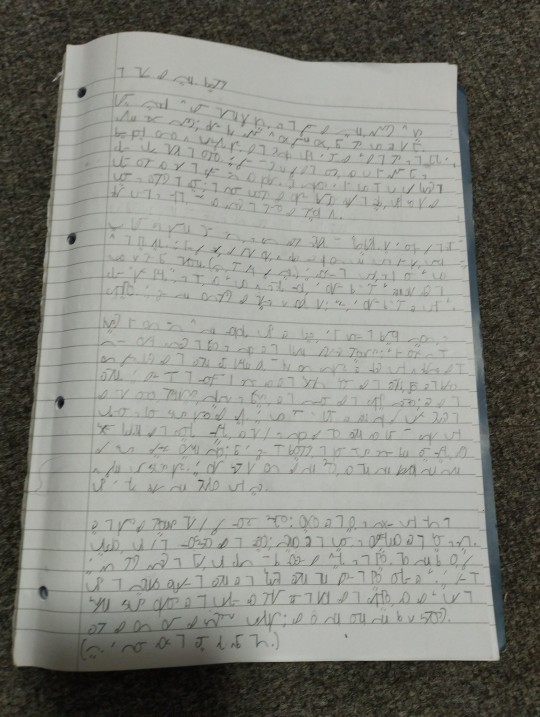
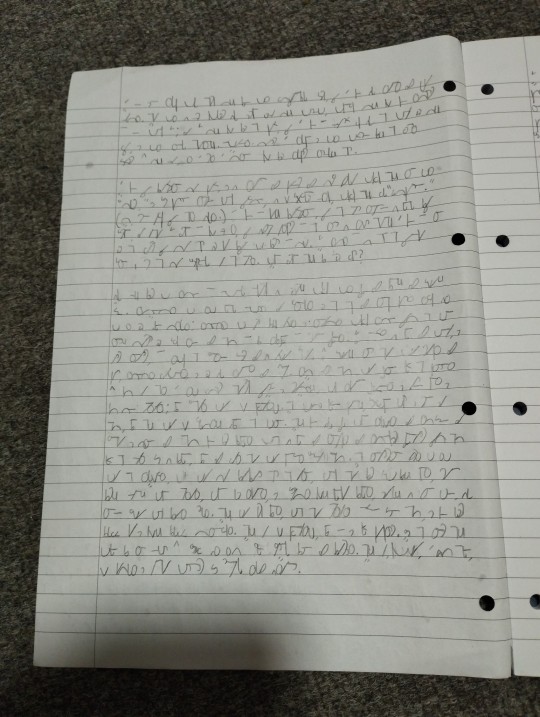
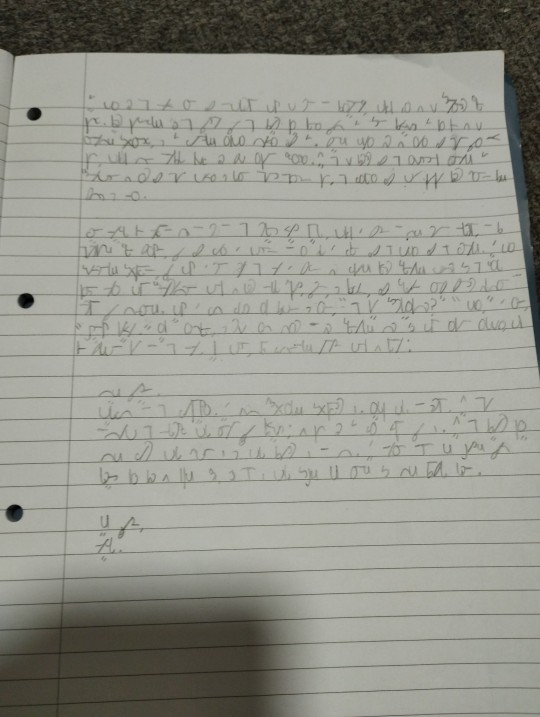
372 notes
·
View notes